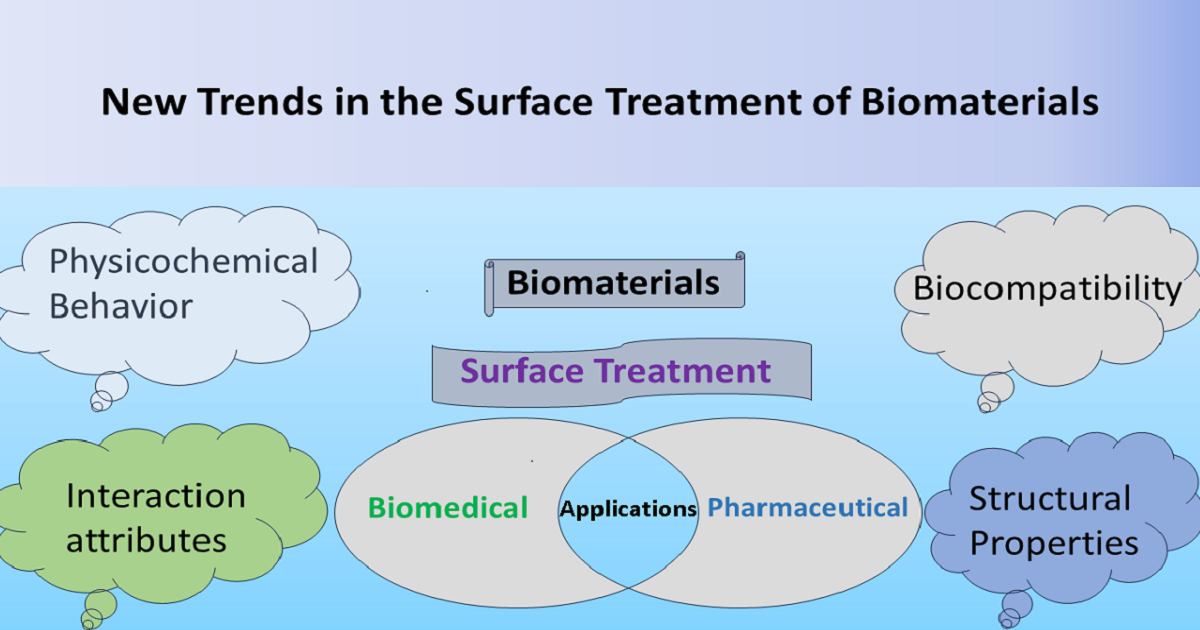- 3.2Impact Factor
- 6.4CiteScore
- 16 daysTime to First Decision
New Trends in the Surface Treatment of Biomaterials
This special issue belongs to the section “Biomaterials“.
Special Issue Information
Dear Colleagues,
The surface plays a pivotal role in the design and application of biomaterials. In particular, the surface properties of biomaterials determine their biocompatibility with biological systems, and these properties may also determine the use of biomaterials in biomedical or pharmaceutical applications. The surface modification of biomaterials aids in tailoring their physicochemical behavior, interaction attributes, structural properties, etc., which helps to significantly improve their biocompatibility. Several physical and chemical surface modification approaches have been used so far for the adaptation of biomaterials to appropriate applications. There are also new trends in the surface treatment of biomaterials, which depend on the needs of the implant and/or artificial organs. Surface properties are also important in wound-healing materials.
The main topics of this Special Issue will cover trends in the surface treatment of a wide group of materials for biomedical applications. New ideas in surface treatment and modification will be expected, especially those that consider an increase in biocompatibility and blood compatibility, which are strongly encouraged.
Prof. Dr. Alina Sionkowska
Dr. Ketul C. Popat
Guest Editors
Manuscript Submission Information
Manuscripts should be submitted online at www.mdpi.com by registering and logging in to this website. Once you are registered, click here to go to the submission form. Manuscripts can be submitted until the deadline. All submissions that pass pre-check are peer-reviewed. Accepted papers will be published continuously in the journal (as soon as accepted) and will be listed together on the special issue website. Research articles, review articles as well as short communications are invited. For planned papers, a title and short abstract (about 250 words) can be sent to the Editorial Office for assessment.
Submitted manuscripts should not have been published previously, nor be under consideration for publication elsewhere (except conference proceedings papers). All manuscripts are thoroughly refereed through a single-blind peer-review process. A guide for authors and other relevant information for submission of manuscripts is available on the Instructions for Authors page. Materials is an international peer-reviewed open access semimonthly journal published by MDPI.
Please visit the Instructions for Authors page before submitting a manuscript. The Article Processing Charge (APC) for publication in this open access journal is 2600 CHF (Swiss Francs). Submitted papers should be well formatted and use good English. Authors may use MDPI's English editing service prior to publication or during author revisions.
Keywords
- biomaterials
- surface treatment
- tissue engineering
- implants

Benefits of Publishing in a Special Issue
- Ease of navigation: Grouping papers by topic helps scholars navigate broad scope journals more efficiently.
- Greater discoverability: Special Issues support the reach and impact of scientific research. Articles in Special Issues are more discoverable and cited more frequently.
- Expansion of research network: Special Issues facilitate connections among authors, fostering scientific collaborations.
- External promotion: Articles in Special Issues are often promoted through the journal's social media, increasing their visibility.
- e-Book format: Special Issues with more than 10 articles can be published as dedicated e-books, ensuring wide and rapid dissemination.

